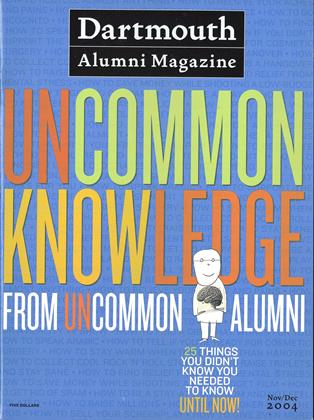"Dartmouth was a major influence. Between professors, roommates, speakers and courses my narrow view of the world was greatly expanded. Along with my privileged education came a sense of responsibility."
"I decided to go into television reporting because I wanted to changethe world. I got to New Haven—so excited to be in the country's 24th largest market—and I had to do a segment on how to carve a pumpkin. I asked myself, 'ls this why I got a Dartmouth education?' I realized I could have more influence teaching."
"When I started teaching I didn't regard myself as either patient or forgiving. I had to learn to be both."
"Teaching is the easiest job to do poorly and the most difficult to do right. To do it right means it's never ending."
"We need to wage war in our classrooms to build a stronger America."
"The most frustrating part of my job is not reaching some students. Sometimes the problems in their lives are so overwhelming I want to bring the kids home with me.'
"A teacher has to demand a lot, explain why the work is important and convey the message You can do it. "I agree with the goals of 'No Child Left Behind.' The best feature is that it forces even successful schools to look at the poor performance of a particular sub- group, be it minority or special ed
"Whether it's appropriate to 'teachto the test' depends on what thetest is. The states that have given up essay questions because of the cost of grading them are measuring only a bunch of data that's been forced into students' heads."
"Teachers have to be held accountable. But it can't be the kind of accountability we have in business. Students aren't widgets."
"The achievement gap between white and black or Latinostudents is a big issue for me. I believe every child can learn; that you just have to find the key that unlocks the door. It can't be just about teaching content. You have to create a caring environment."
"Some teachers get nervous dealing with parents. I view it as a partnership."
"My social studies students complain they learn more aboutwriting in my class than they do in English. I think even phys ed teachers should require their students to write. It's such a criti- cal skill. Life is interdisciplinary. I don't sit down to balance my checkbook and think, 'Today I'm a mathematician.
"Attracting the best teachers to the worst schools isn't aboutsalaries. It's about working conditions. We have to focus on a way teachers can take those jobs without feeling overwhelmed."
"The most important attribute for a teacher is a sense ofhumor.""When I visited the White House for the Teacher of the Yearceremonies I kept thinking about the heroes I have who'dserved there. My heart was beating so fast I asked people if they could see it pounding."
"It infuriated me when some people compared the Teacherof the Year program to the Miss America contest. Then I found myself in Washington with a huge group of people whose names I couldn't remember and saying, 'Excuse me, Ms. Alaska, could you pass the ketchup?'"
"To teach history you can't be looking back; you must always look forward. If something's not relevant to today, I question why I'd teach it."
"President Bush struck me as a remarkablycharming, down-to-earth, friendly man. I don't agree with all his policies, but I could see why people are drawn to him. I told him I wanted to thank his mother for pushing people to be literacy volunteers. That's what made me decide to become a teacher."
"The satisfaction at the end of the day comes from feeling you've done the most important job in the world. You've shaped a child's future."
An award-winning teacher on the most important job in the world
CAREER: Teacher since 1989. Currently teaching social studies at Metropolitan Learning Center (a magnet school) in Bloomfield, Connecticut; television reporter, 1984-1988 NOTABLE ACHIEVEMENTS: USA Today All-Star Teacher, 2003; Connecticut Teacher of the Year, 2003 EDUCATION: A.8., government; master's in journalism, Northwestern, 1984; master's in history and social studies, Southern Connecticut State University, 1990 FAMILY: Husband Matthew; sons David, 16, and Sam, 10
 View Full Issue
View Full Issue
More From This Issue
-
 Cover Story
Cover StoryUncommon Knowledge From Uncommon Alumni
November | December 2004 By Jennifer Wulff ’96 -
 Feature
FeatureThe Producer
November | December 2004 By Molly Selvin -
 Article
ArticlePresidential Range
November | December 2004 -
 Sports
SportsThe Professional
November | December 2004 By Mike O'Connell ’65 -
 Interview
Interview“A Time of Living”
November | December 2004 By Lisa Furlong -
 Alumni Opinion
Alumni OpinionHarpooning a Liberal
November | December 2004 By Dinesh D’Souza ’83
Lisa Furlong
-
 Continuing Ed
Continuing EdBobby Charles ’82
Jan/Feb 2006 By Lisa Furlong -
 Continuing Ed
Continuing EdKaren (Jennings) Lewis ’74
May/June 2011 By Lisa Furlong -
 Article
ArticleTimothy Edgar ’94
MAY | JUNE By LISA FURLONG -
 CONTINUING ED
CONTINUING EDNeal Kumar Katyal ’91
MAY | JUNE 2018 By LISA FURLONG -
 CONTINUING ED
CONTINUING EDSam Stein ’04
SEPTEMBER | OCTOBER 2021 By LISA FURLONG -
 CONTINUING ED
CONTINUING EDSue (DuBois) AnderBois ’05
MARCH/APRIL 2023 By LISA FURLONG
Continuing Ed
-
 Continuing Ed
Continuing EdLaura Ingraham ’85
Nov/Dec 2002 By Lisa Furlong -
 Continuing Education
Continuing EducationPeter G. Fitzgerald '82
Nov/Dec 2003 By Lisa Furlong -
 Continuing Ed
Continuing EdLeah Daughtry ’84
July/August 2006 By Lisa Furlong -
 Continuing Ed
Continuing EdArt Koff ’57
May/June 2012 By Lisa Furlong -
 Continuing Education
Continuing EducationMichelle (Valensi) Stacy ’77
MAY | JUNE 2014 By LISA FURLONG -
 CONTINUING ED
CONTINUING EDMatt Klentak ’02
JULY | AUGUST 2018 By LISA FURLONG

